List of cathedral prods in Münster
The cathedral provosts in Münster were at the head of the dignitaries of the Münster cathedral chapter at the time of the Holy Roman Empire . In the 14th century they were largely disempowered, even if they retained their rank. The leadership in the cathedral chapter took over the Domdechanten .
| Image / coat of arms | Surname | gender | Life dates | Term of office | Remarks |
|---|---|---|---|---|---|
| Reginbertus | 809-814 | ||||
| Hardrat | 889 | ||||
| Odo | 1022-1032 | ||||
| Arnold | 1042-1063 | ||||
| Erpho | until 1085 | Possibly brother of Bishop Hermann von Bamberg and himself since 1085 Bishop of Münster
|
|||
| Ludolf | 1085-1092 | ||||
| Bruno von Berg | Counts of Berg | 1125-1131 | He also had prebends in other monasteries and was later Archbishop of Cologne . As provost in Münster he is only mentioned in one document. | ||
| Heinrich | 1134-1154 | During his time, the cathedral provosty began to separate from the cathedral chapter | |||

|
Rainald von Dassel | Counts of Dassel | 1154-1167 | Friedrich I appointed him Chancellor of the Reich in Münster in 1156. In 1159 he became Archbishop of Cologne | |
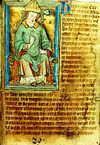
|
Hugo | 1167-1168 | He became Bishop of Verden in 1167 | ||
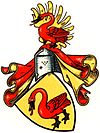
|
Bernhard von Steinfurt | Lords of Steinfurt | 1168-1193 | Together with his brother Ludolf, he founded the Johanniterkommende Steinfurt . | |
| Hermann | 1192-1206 | He was a close relative of Bishop Hermann II von Katzenelnbogen | |||
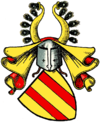
|
Rembold | Lords of the County | 1206-1238 | He may have been a member of the Grafschaft noble family. He was previously cathedral choirmaster. Later he was on various occasions on the papal mandate and is attested by numerous documents. He transformed some of the natural differences into monetary payments to the canons. He resigned from office before his death, but retained the title. A seal with his picture has been preserved from him. | |
| Wilhelm von Holte (I.) | Lords of Holte | 1238-1239 | He was the brother of Bishop Ludolf von Holte . First mentioned as a canon in 1196. In Osnabrück he had been provost of the cathedral since 1227. Possibly he was also cathedral dean in Hildesheim . It is also possible that he took part in the Damiette crusade. | ||
| Wilhelm von Holte (II.) | Lords of Holte | 1241-1259 | He was the brother of Bishop Wigbold von Holte . To distinguish it from its predecessor, it was called Wilhelmus secundus. As a bishop he was counted as Wilhelm I. He was vice-dominus and cathedral thesaurar. He was also provost of St. Mauritz . In 1257 he formed an alliance with the city of Münster. He was elected bishop in 1259. | ||

|
Gerhard von der Mark | Counts of the Mark | 1260-1262 | He also had a preamble in Maastricht and was elected Bishop of Munster | |
| Hermann von Didinghoven | 1262-1263 | He was previously the cathedral choirmaster, cathedral dean and provost at the old cathedral | |||

|
Widekind from Waldeck | Count of Waldeck | 1263-1265 | Around 1256 he was provost of Fritzlar and later was bishop in Osnabrück | |
| Walram from Kessel | Counts of Kessel | 1265-1295 | Because of the controversial election of bishops, he and the cathedral chapter elected Otto von Tecklenburg to the monastery administrator. He was also provost in Beckum and held a canon at St. Gereon in Cologne . As the surviving heir to County Kessel , he resigned and married. | ||

|
Engelbert of Tecklenburg | Count of Tecklenburg | 1296-1301 | ||
| Wikbold from wages | Noblemen of wages | † 1312 | 1307-1310 | As a canon, he was one of the opponents of Bishop Otto III. von Rietberg , who asked the cathedral chapter to proceed against him with suspension and excommunication. Wikbold later appeared as a witness against the bishop. After the bishop was deposed, he became provost of the cathedral. The post had previously been filled for several years. Since 1309 he was a member of the council appointed by Konrad von Berg , which led the government in the bishopric of Münster . Pope Clement V canceled the election of Bishop Konrad and criticized Wikbold's behavior. For reasons unknown, he had given up and married. | |
| Johannes Luf von Kleve called von Kervenheim | Nobles Luf von Kleve | 1310-1313 | He lost his life in disputes with Heinrich II von Korff over claims against the cathedral chapter | ||
| Alexander von Lüdinghausen | † 1314 | 1313-1314 | He was pastor in Lüdinghausen and provost of St. Mauritz. | ||

|
Gottfried von Arnsberg | Counts of Arnsberg | 1315-1321 | He became bishop of Osnabrück in 1321 . His seal as provost, which shows him kneeling, has been preserved | |

|
Konrad von der Mark | Counts of the Mark | 1321-1326 | He was previously provost of St. Martini in Worms, canon in Cologne and possibly also canon of St. Gereon . He resigned and married Elisabeth von Cleve. He founded the monastery Clarenberg and entered the Minorit a | |
| Siegfried Luf von Kleve called von Kervenheim | Nobles Luf von Kleve | † 1340 or 1342 | 1327-1337 | He followed his brother Johann as provost of St. Ludgeri and Beckum. he was probably also a canon in Xanten . When Bishop Ludwig of Hesse was taken prisoner in 1322, he became a monastery administrator. He must have given up before his death | |

|
Everhard von der Mark | Counts of the Mark | † 1359 | 1339-1347 | He was cathedral canon in Liège and cathedral choirmaster in Cologne. He resigned and married Countess Maria von Lohn |

|
Dietrich von Waldeck | Count of Waldeck | † around 1316, 1355 | 1348-1353 | He studied canon law in Orléans , had cathedral preachers in Cologne and Münster, resigned them in 1346, but was provided by the Pope in the same year. New was a canon post in Mainz . |
| Everhard from Vechtorp | † around 1391 | 1353-1356 | He was also provost at the old cathedral and pastor of Groenlo . He was excommunicated and suspended for disobedience to Bishop Ludwig. He has apparently kept his cathedral canon. | ||
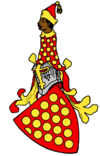
|
Otto von Bentheim | Count of Bentheim | † 1366 | 1356-1359 | He was provost of the cathedral in Paderborn from 1338 . Because of the simultaneous possession of the cathedral provost offices in Paderborn and Münster, he was from Pope Innocent VI. called for resignation. However, this did not happen immediately. |

|
Christian von Bentheim | Count of Bentheim | † around 1418 | 1361 | He was the brother of his predecessor. He was a cathedral canon in Cologne. He gave up this position for the first time in 1361, in exchange for the altar of the Virgin Mary in Schüttdorf . From 1365 he was provost again. He evidently carried out his office with little zeal. The end of his term and the circumstances are unclear. He may have resigned or been suspended. He was mentioned as a canon in 1384 and still lived in 1417. He left a son. |

|
Bernhard von Bentheim | Count of Bentheim | † 1421 | 1361-1365 | He was the brother of his two predecessors. He exchanged an altar with his brother and received the Dompropstei for it. He resigned in 1365 and took control of the county of Bentheim . He was married twice, but remained childless and was the last count from the Bentheim-Holland line. |

|
Christian von Bentheim | Count of Bentheim | † around 1418 | 1365-1367 | see above |
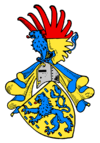
|
Heinrich von Solms | Solms | † 1407 | 1373-1374 | He was first dean in Nottuln . He was probably provost until 1374. In 1376 he was solved by an excommunication. Later he was provost of St. Mauritz. He left an illegitimate daughter. |
| Heidenreich Wolf von Lüdinghausen | Wolf von Lüdinghausen | † around 1392 | 1379-1381 | He came from a family of ministers. He was first pastor in Herzfeld , canon in Münster and canon in Soest . In 1376 he was a cathedral scholar. As provost, he and the cathedral chapter renewed the alliance with the Archbishopric of Cologne . He also hoped for the archbishop's support for the election as Bishop of Munster. In 1381/82 he followed the deposed Florence of Wevelinghofen . | |
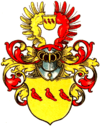
|
Konrad von Velen | Velen | 1380 | His papal commission does not appear to have taken effect. | |

|
Wilhelm Freseken | Frescos | † 1401 | 1381-1390 | He was provost in the Meschede monastery , canon in Soest, provost of St. Aposteln in Cologne. He received from Archbishop Friedrich III. from Saar become the Gut Wildshausen . As provost of the cathedral, he was one of the tricksters in a dispute between Archbishop Friedrich and Count Engelbert von der Mark . He gave a house to the Oelinghausen monastery . He was entrusted by the bishop and cathedral chapter with the defense of the rights of the chapter against all enemies, but saw himself unable to fulfill this task and resigned himself. he remained provost of St. Apostles. |
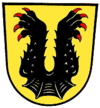
|
Otto von Hoya | Counts of Hoya | † 1424 | 1390-1392 | He was the brother of Bishop Johann von Hoya from Paderborn. He himself became Bishop of Münster in 1392 and considerably expanded the territory of the Monastery of Münster. In 1410 he also became Bishop of Osnabrück |

|
Engelbert of Nassau-Dillenburg | Nassau-Dillenburg | † 1442 | 1399-1404 | He resigned in favor of his brother Johann, married and founded the Nassau-Breda line |

|
Johann of Nassau-Dillenburg | Nassau-Dillenburg | † 1429/30 | 1404-1421 | He was the brother of the previous one. He was also the owner of the archdeaconate of Brabant . With papal permission it retained this office as provost of the cathedral. He was also canon in Cologne. He resigned the Dompropstei in 1421 |
| Heinrich von Nassau-Beilstein | Nassau-Beilstein | † 1477 | 1421-1429 | He had studied and obtained a master's degree. He resigned the cathedral provost to accept a cathedral canonical in Mainz, where he was cathedral provost from 1433-1475. He also held a canon position in Cologne, was provost of St. Cassius in Bonn and Cologne council. | |

|
Dietrich Droste zu Vischering called Manenschyn | Droste to Vischering | † 1465 (?) | 1429-1462 | He was first mentioned as a canon in 1418 and was pastor in Havixbeck . As provost of the cathedral, he agreed to the stricter chapter statute of 1435, which further restricted the provost's power. This settled a dispute with the cathedral dean and the chapter. In 1446 he declared the union of the cathedral chapter and in 1447 contributed to the reconciliation of the chapter with the bishopric. During the Munster collegiate feud , he assumed an ambivalent position. By 1462 at the latest, he resigned the cathedral provost but remained a canon. |
| Johann von Bronckhorst-Batenburg | Bronkhorst | † around 1505 | 1462-1505 | His time before taking over the cathedral provost is unknown. He was also provost of St. Mauritz. Lately he seems to have hardly been in Munster and has been to Rome at times. | |

|
Philipp von Hoerde | Hoerde | * around 1450; † 1510 | 1505-1510 | He was married and had a number of children. He initially held a number of secular offices. He was Landdrost of the Hochstift Paderborn , princely Paderborn councilor and Landdrost of the Electoral Cologne Duchy of Westphalia . He was very religious and a member of numerous brotherhoods, made foundations for monasteries and went on a pilgrimage to the Holy Land. After the death of his wife he entered the clergy, became canon in Münster and provost. |

|
Bernhard of Saxe-Lauenburg | Saxony-Lauenburg | † 1523 | 1510-1523 | He was canon in Cologne. After his election as provost of the cathedral, he was rarely in Munster. He was also rector of the parish church in Senden . |

|
Alexander Morrien | Morrien | † 1552 | 1524-1552 | In 1514 he was canon and later vice-dominus. The assault of the Baptist on Telgte he escaped. He is often mentioned in documents and distinguished himself as a benefactor for the Franciscans, poor houses and the Paulinum grammar school . He had two sons |

|
Wilhelm Ketteler | Ketteler | † 1582 | 1552-1553 | He studied in Bologna . After his election as Provost of the Cathedral, he was also the Münsterscher and Kleve-Jülischer councilor. He signed the chapter statute on elections and the allocation of offices in the cathedral chapter. He was elected bishop, but because of his Protestant inclinations he did not want to swear allegiance to the Pope. He gave up his episcopate in 1557. In 1566 he was episcopal plenipotentiary at the Reichstag in Augsburg . |

|
Bernhard of Munster | Muenster | * around 1500; † 1557 | 1553-1557 | He was first mentioned as a canon in 1522. Since 1546 he was the owner of the Scholving office . He was in command of the House of Lüdinghausen and had a son. |
| Arnold de Bever | 1557 | He was initially a priest in Neuenhaus and was canon from 1537. He already studied as a canon in Marburg and Bologna. In 1553 he became a cathedral choirmaster. After his election as Provost of the Cathedral, the Domkapiteö entrusted him with the Lüdinghausen House and Office. | |||

|
Bernhard Morrien | Morrien | † 1581 | 1558-1569 | In 1552 he was mentioned as a canon and student in Heidelberg . From 1555 he was archdeacon of Stadtlohn . In 1557 he traveled to the Reichstag in Regensburg. After his resignation as provost of the cathedral, he became archdeacon of Altlünen, among other things . |

|
Raban von Hörde | Hoerde | † 1575 | 1569-1575 | He had been a cathedral canon in Münster since 1554. He was also canon in Paderborn, where he was cathedral scholaster. In Münster he was Vice-Dominus from 1558 and Archdeacon in Bork from 1565 . He had several children. |

|
Goswin von Raesfeld | Raesfeld | † 1586 | 1575-1586 | He had been the owner of a cathedral priest since 1555, studied in Bologna and received the archdeaconate city wages in 1569. From 1574 he belonged to the government of the bishopric of Münster. He took over the cathedral provost with misgivings. Through various incorporations, the income from the Dompropstei was improved. He belonged to the Protestant party in the cathedral chapter. His epitaph was created by Hans Lacke from Lüdinghausen. |

|
Lukas Nagel | nail | † 1611 | 1587-1611 | He had been canon from 1569 and in 1577 belonged to the Protestant party of juniors in the cathedral chapter. Among other things, he was archdeacon of Stadtlohn. Contrary to his requests, he was elected provost of the cathedral. He was cohabiting and had four children. |

|
Ferdinand of Bavaria | Wittelsbach | * 1577, † 1650 | 1611-1612 | He was canon from 1609. The election of provost was difficult, given his position as coadjutor of Ernst von Bayern, and remained in suspense until Bishop Ernst died in 1612. Then Ferdinand was able to do without the provost and was elected bishop |
| Otto von Dorgelo | Dorgelo | * 1565; † 1625 | 1612-1625 | He was canon in Osnabrück and since 1590 in Münster. He had studied at the Collegium Germanicum in Rome for six years. In 1600 he donated a bishop's statue in the cathedral. He visited Marienfeld Abbey and other Cistercian monasteries in the diocese. He was probably ordained a priest. When he was elected provost of the cathedral, only seven of eighteen voters voted for him. Although the election was invalid, the intention was to avoid a new election in order to avoid problems with the Pope. Afterwards, an amicable agreement was reached on Dorgelo. The Elector of Trier Lothar von Metternich had meanwhile applied to the Pope for a commission in favor of a relative. The cathedral chapter protested against this because the election of the provost by the chapter was previously undisputed and a commission was therefore inadmissible. Metternich was ready to let the process rest for the time being. | |

|
Adolf Heinrich Droste zu Vischering | Droste to Vischering | † 1650 | 1625-1650 | He was canon from 1612. In 1619 he was at the Reichstag in Regensburg with Elector Ferdinand of Bavaria . In 1621 he became a cathedral scholar. His election as provost of the cathedral did not take place at first because there was disagreement about the cost of papal confirmation. Urban VIII announced a commission in his favor some time later. The chapter agreed because the Pope had basically recognized the principle of free election of provosts. He was also a canon in Osnabrück and Paderborn. He was ordained a deacon and priest in 1639. |

|
Otto Heinrich Korff called Schmising | Korff | † 1664 | 1650-1664 | He was canon in Hildesheim and Münster, and later also cathedral cantor in Osnabrück. As provost of the cathedral, he was particularly involved in the election of Christoph Bernhard von Galen as bishop. He was also later one of the supporters of Galens. |
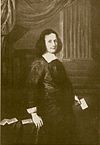
|
Wilhelm Freiherr von Fürstenberg | Furstenberg | * 1624; † 1699 | 1664-1699 | He was canon in Münster, domicellar and cathedral canon in Trier , he studied in Cologne and Paris. He was Münster's Privy Councilor and in 1651 envoy to the Reichstag in Regensburg. From 1661 he was the papal secret chamberlain and lived temporarily in Rome. He received a number of other preambles in various dioceses. In Salzburg he was also a secret councilor. When he was elected provost of the cathedral in Münster, he did not want to take up the post, but allowed his brother, the Paderborn bishop Ferdinand von Fürstenberg, to persuade him to do so. From Rome he reported the acceptance of the election. Because of his merits, the cathedral chapter decided to refrain from compulsory residence. From Rome he moved to Salzburg, where he was dean and ordained a priest. |
| Dietrich Anton von Velen | Velen | * 1647; † 1700 | 1699-1700 | He was a cathedral canon in Münster and studied in Paris. He became Vice Dominus, was a secret councilor and diplomat. When he was elected, there was a dispute with the Pope because he had provided someone else. Before the conflict was settled, von Velen died and received a large epitaph in the cathedral. | |
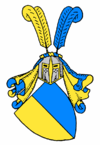
|
Ferdinand Freiherr von Plettenberg | Plettenberg | * 1650, † 1712 | 1700-1712 | He studied in Rome and was canon in Münster and Paderborn. There he was ordained a priest and elected cathedral dean. He also held canon positions in Mainz and Hildesheim. As Provost of the Cathedral, he ran for the office of bishop himself in 1706, but then supported Franz Arnold von Wolff-Metternich zur Gracht . He worked as a diplomat at various European courts, including Vienna and Versailles . |

|
Wilhelm Hermann Ignatz Wolff-Metternich to the canal | Wolff-Metternich | * 1665; † 1722 | 1712-1722 | He was a half-brother of Bishop Franz Arnold. He studied in Siena and received a canon position in Münster. He also had jobs in Paderborn, Speyer and Hildesheim. After his election as provost of the cathedral, he also became a secret councilor and district president. In Paderborn he became cathedral dean. After the bishop's death he was administrator there. From 1720 he was auxiliary bishop. |
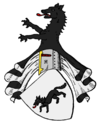
|
Georg Wilhelm Wolff von Gudenberg | Wolff von Gudenberg | † 1726 | 1722-1726 | He studied in Rome, became canon in Speyer and then in Osnabrück and Münster. After his election as Provost, he was also President of the Court Chamber . |
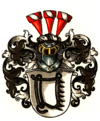
|
Jobs Matthias von Twickel | Twickel | 1681, 1729 | 1726-1729 | He studied in Angers and later in Siena, was canon in Speyer and Münster, and later also in Hildesheim. He served as envoy in Vienna in 1707/08 and was ordained a priest in 1712. From 1717 he was provost at the Old Cathedral. Baron von Merveldt complained in Rome against his election as provost of the cathedral. After his election he was also a Privy Councilor and Council of War. |
| Baron Karl Franz von Wachtendonck | Wachtendonk | * 1668; † 1731 | 1729-1731 | He studied in Angers and was canon in Münster and Osnabrück. He ran in Osnabrück in vain for the office of bishop and supported Karl von Lorraine in Münster, also without success. In Münster and Osnabrück he became a cathedral scholaster. He was also a secular court judge in Munster. | |

|
Friedrich Christian Heinrich von Plettenberg | Plettenberg | 1682, 1752 | 1732-1752 | He was canon in Münster and Paderborn, was Münster chief hunter, vice-dominus of the cathedral monastery, as well as a secret district and war councilor. He was provost at the old cathedral and cathedral scholaster. After his election as provost of the cathedral, he was also president of the Münster government and general commissioner of the court chamber. |

|
August Wilhelm von Wolff-Metternich | Wolff-Metternich | * 1705; † 1764 | 1753-1764 | He studied in Rome and became canon in Paderborn. He was a favorite of Clemens August von Bayern . Through this he also obtained a canon position in Osnabrück and became cathedral sexton. He received a canon post from the Pope in Münster. After his election as provost of the cathedral, he lost the favor of the elector in 1755. He lost all his offices at court in Bonn and had to leave the city. |
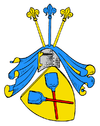
|
Friedrich Wilhelm Nikolaus Anton von Boeselager | Boeselager | * 1713; † 1782 | 1764-1782 | He was a canon in Münster and in 1761 applied unsuccessfully for the election of bishops. After the election to the cathedral provost, he was also president of the secret council. |

|
Clemens August von Ketteler | Ketteler | * 1720; † 1800 | 1782-1800 | He was domicellar in Worms, canon in Münster and Osnabrück. In Münster he was also provost at the old cathedral, secret councilor, from 1766 head foreman at the cathedral and in 1780 cathedral sexton. After his election as provost of the cathedral, he also became president of the secret council. |
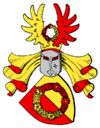
|
Engelbert Anton von Wrede | Wrede | * 1742; † 1808 | 1800-1808 | He was canon in Münster and Hildesheim. In Munster he was cathedral sexton and in Hildesheim cathedral scholaster. He was also the Münster secret council. After his election as provost of the cathedral, he also became president of the secret council. |
| Heinrich Johannes Franz von Droste zu Hülshoff | Droste to Hülshoff | * 1768; † 1836 | 1808-1836 | He was canon in Münster and Osnabrück, the last provost of the cathedral who came from the nobility and an uncle of the poet Annette von Droste-Hülshoff |
literature
- Wilhelm Kohl: The cathedral monastery of St. Paul in Münster. Berlin, 1982 (Germania sacra NF 17.2).
